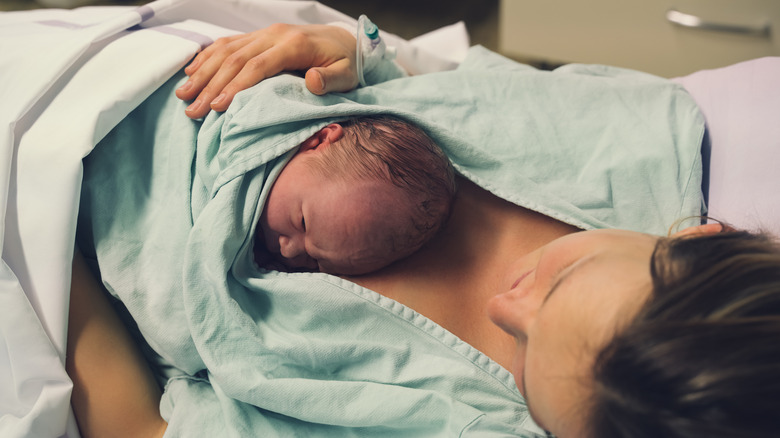This Is How Your Body Knows When To Go Into Labor
There's often no real way to predict when you'll go into labor — a baby could come prematurely, right around the estimated due date, or well after. That being said, how does your body know when to give birth?
Pregnancies typically last about 280 days, or 40 weeks, according to the American College of Obstetricians and Gynecologists. While there are plenty of exceptions, most women birth their babies between 38-41 weeks, though there's no real way to predict exactly when a baby will come.
Some indications that labor is beginning include the loss of the mucus plug that forms in your cervix, the amniotic sac rupturing (also known as your "water breaking"), contractions of the uterus, and a feeling of the body lightening as the baby moves away from your diaphragm. All women and pregnancies are different, but if it's your first baby, the average length of labor is around 12-18 hours. If you've already had children, labor may be shorter, typically 8-10 hours.
The baby lets the body know
A paper published in The Journal of Perinatal Education in 2007 shed light on how exactly your body knows when to go into labor. The last weeks of pregnancy are important for the baby's development. During this time, the baby puts on a protective layer of fat (hello, chubby newborn), and the lungs finish maturing. Scientists were previously unsure of how the body knows when the baby is ready to be birthed. Now, researchers believe that the baby secretes a small amount of a protein that signals to the mother's body to release hormones that initiate labor.
A 2004 study published in the National Academy of Sciences found that in mice, this protein that was present in the amniotic fluid came from the fetal lung once it had properly matured. The researchers suggested that the body will know when to go into labor based on the complete development of the baby's lungs.
This also indicates that allowing labor to start when the baby is ready may be safer for the baby than inducing labor (via The Journal of Perinatal Education). You're twice as likely to have a cesarean section when inducing labor. Induction often happens out of medical necessity when your water has broken but labor hasn't started, pregnancy goes beyond 42 weeks, you have high blood pressure or diabetes, you have an infection in the uterus, or your baby's growth is too slow.


